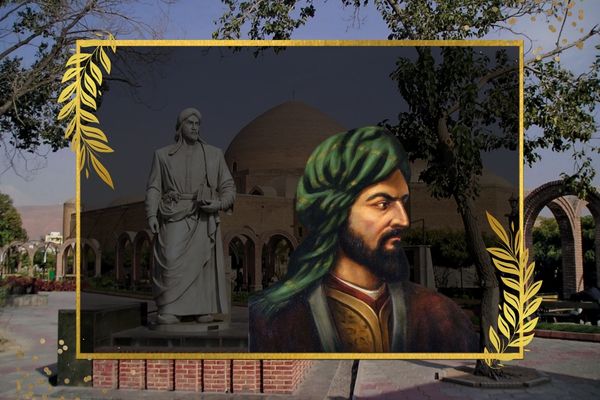Khaqani Shirvani (1121 CE – 1190 CE) was one of the most celebrated Persian poets of the medieval period, renowned for his mastery of the qasida (ode) form and his rich, intricate language. Born as Afzal al-Din Badil ibn Ali Khaqani in Shirvan, in the Caucasus region (modern-day Azerbaijan), he rose to prominence as a court poet and later became known for his profound philosophical reflections, moral teachings, and religious devotion.
Early Life and Education
Khaqani was born into a modest family. His father was a carpenter or a doctor, while his mother was a Christian convert to Islam. Despite humble beginnings, Khaqani’s intellectual brilliance became evident early on. He received a comprehensive education in Persian and Arabic literature, Islamic theology, medicine, and astronomy, under the guidance of prominent scholars, including his uncle, who first introduced him to poetry.
His talent and intellect earned him patronage at the court of the Shirvanshahs, rulers of Shirvan, where he adopted the pen name "Khaqani," meaning "regal" or "royal," to reflect his position as a court poet.
Poetic Career
As a poet, Khaqani is noted for his unparalleled skill in the qasida form. His poetry is characterized by its complexity, dense imagery, and deep emotional resonance. Khaqani’s themes often include:
- Courtly Praise: Early in his career, he wrote lavish praises of his patrons, the Shirvanshahs.
- Philosophy and Religion: His poetry reflects his deep engagement with religious and philosophical questions, particularly after he distanced himself from court life.
- Travel and Exile: His travels to Mecca and other parts of the Islamic world are vividly described in his works, particularly in his famous Tuhfat al-Iraqain ("Gift of the Two Iraqs"), a poetic travelogue.
- Personal Struggles: His later works express profound grief, existential doubt, and disillusionment, stemming from personal tragedies and periods of imprisonment.
Major Works
- Diwan: Khaqani’s collected poems include qasidas, ghazals, and rubaiyat, showcasing his mastery of diverse poetic forms and themes.
- Tuhfat al-Iraqain: This masterpiece is a reflective account of his pilgrimage to Mecca, blending travel writing with philosophical and spiritual musings.
- Christian Imagery: Due to his mother's Christian background and his exposure to diverse cultures, Khaqani often incorporated Christian symbols and references into his poetry, making his work unique in Persian literature.
Philosophy and Style
Khaqani's poetry is renowned for its intellectual depth, dense allusions, and intricate metaphors. He combined religious devotion with sharp criticism of worldly corruption, particularly targeting hypocritical rulers and clergy. His philosophical musings often convey a sense of existential inquiry and the transient nature of life.
Later Life and Legacy
Khaqani faced numerous challenges later in life, including imprisonment and the deaths of close family members, which profoundly affected his poetry. After leaving the Shirvanshah court, he settled in Tabriz (modern-day Iran), where he spent his final years.
Khaqani’s influence on Persian literature is immense. His works inspired later poets, including Rumi and Hafez, and his intellectual rigor and poetic complexity set a high standard for Persian qasida writing. Today, Khaqani is remembered as one of the giants of Persian classical poetry, whose works continue to be studied for their artistic and philosophical brilliance.
Sokhanvar information
Published on Dec. 27, 2024, 5:22 p.m. by @admin
- Name: Afzal al-Din Badil ibn Ali bin Othman Khaqani
- Persian Name:: افضلالدّین بدیل بن علی بن عثمان
- Alias: Khaqani
- Comments: 0
- Views: 1198
Works
Diwan: Khaqani’s collected poems include qasidas, ghazals, and rubaiyat, showcasing his mastery of diverse poetic forms and themes.
Tuhfat al-Iraqain: This masterpiece is a reflective account of his pilgrimage to Mecca, blending travel writing with philosophical and spiritual musings.
Christian Imagery: Due to his mother's Christian background and his exposure to diverse cultures, Khaqani often incorporated Christian symbols and references into his poetry.

